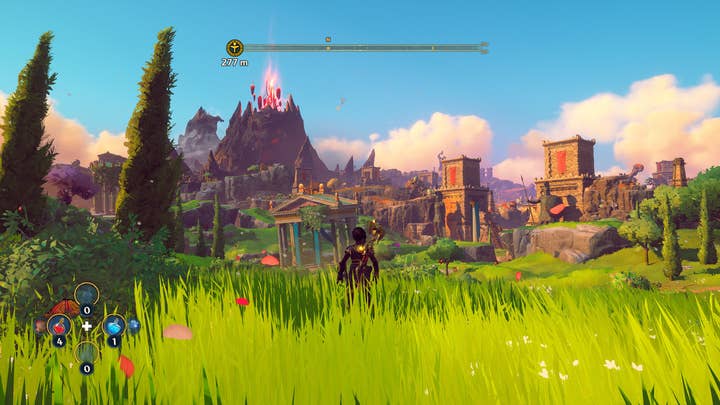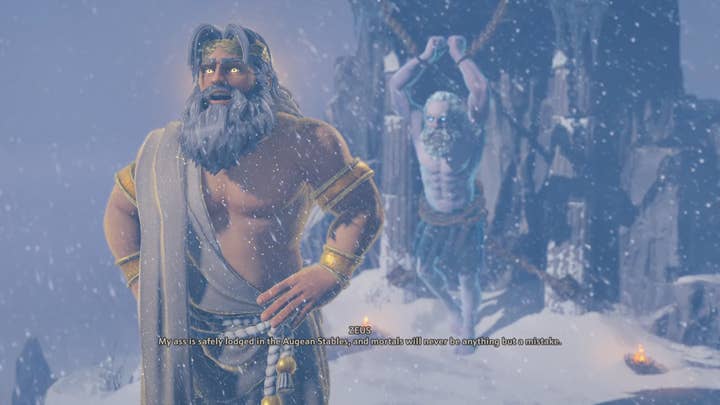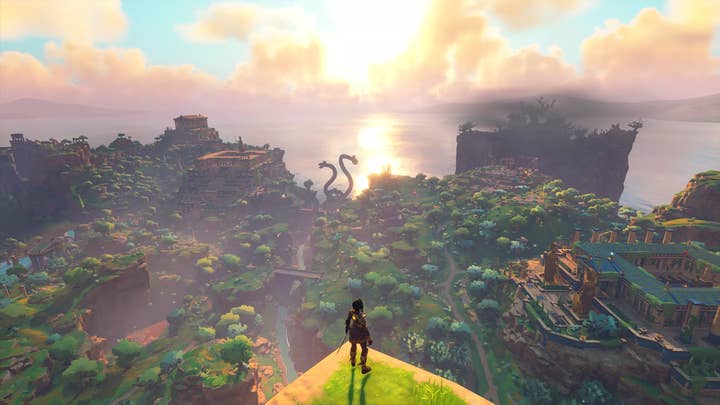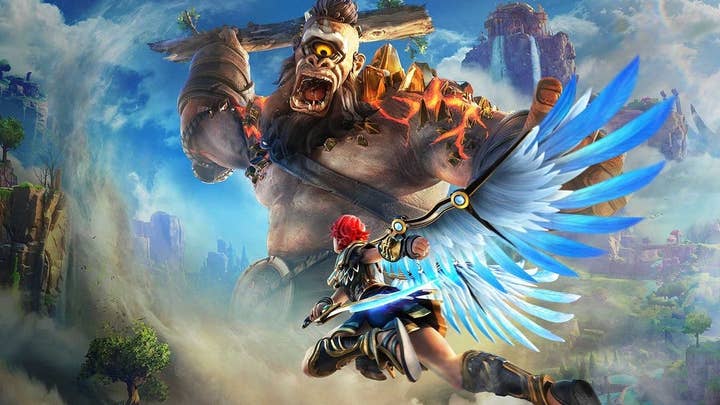Immortals: Fenyx Rising | Critical Consensus
Critics praise Greek mythology-inspired adventure for streamlining Ubisoft's open world formula, but the game struggles to escape Zelda's shadow
December is an odd time to release any video game. By the year's closing month, the vast majority of major Q4 titles are already on shelves, with Black Friday deals potentially adding more to gamers' 'to play' pile, so it's easy for a December release to be overlooked -- unless that title has already built up plenty of anticipation, like next week's Cyberpunk 2077.
Immortals: Fenyx Rising -- an open-world adventure set in the mythological realm of Ancient Greece's gods -- finds itself in a particularly precarious position, given that it not only launches December 3 but follows in the wake of two higher-profile open-world games. And both were from its own publisher.
Originally unveiled as Gods & Monsters -- a title that coincidentally changed after drinks provider Monster Energy challenged Ubisoft's trademark application -- Immortals was supposed to be on shelves in Q1 2020. Traditionally, Q1 is a quieter period for releases and one that might benefit a brand new IP. Instead, launching five weeks after Watch Dogs Legion and just three weeks after Assassin's Creed Valhalla means Immortals has to fight that much harder against its bigger brothers to gain attention.
Fortunately, critics have given the game a warm reception. Its Metacritic scores currently range from 75 on Nintendo Switch to 82 on Xbox Series X|S -- faring better than Watch Dogs, but not quite meeting the levels of Assassin's Creed.
"Immortals can't help from becoming a game that shoves you down a path after spending so long letting you create your own"
Tyler Colp, Polygon
Of course, while there is much crossover between the audiences of the latter two titles, Immortals is appealing to a different demographic with its lower age rating and colorful visuals. One might even go as far to say it's targeting the Nintendo audience, something every review we read comments on.
The inspiration Immortals takes from Zelda: Breath of the Wild is undeniable. The graphical style is similar to that of Nintendo's 2017 masterpiece, the 'go anywhere, climb anything, glide through the sky' ethos is core to the gameplay, and instead of four champions, protagonist Fenyx must restore four Gods in order to take on the final boss. The game even litters its map with puzzle rooms known called vaults -- an obvious take on Zelda's shrines -- and some of the gods' blessings, such as a healing ability, are extremely similar to those Link gains during his adventure.
With no top-tier Nintendo title heading to its console this Christmas -- except a spin-off to the very game Immortals draws inspiration from -- the Switch version becomes particularly interesting.
In her 7/10 review for NintendoLife, Kate Grey says the inspirations drawn from other games -- especially Nintendo's -- are all too obvious.
"It's trying to be a lot of things, and it's got the right ideas, but it's just not quite as good as any of them," she writes.
"Comparing a game to another game can feel lazy, but Immortals Fenyx Rising... isn't shy about hiding its influences. The game is the off-brand cereal version of Zelda: Breath of the Wild, mixed with a large helping of Assassin's Creed and a generous dash of God of War."

Christian Donlan, however, suggests that Immortals "rarely actually feels like Zelda" while playing. In his unscored Eurogamer review, he notes that the landscape "feels far more compacted and artificial" than Hyrule, like everything has been designed with a purpose.
"Zelda was filled with stuff to do, but it was also good at making the world feel natural," he explains. "It had huge expanses -- meadows, mountainsides, lakes -- where it didn't really seem to have anything specific in mind for you. Somehow, this created a sense of immersion, even wonder. I am just about ready to be told that Immortals' footprint is actually bigger, but Hyrule always felt bigger. And at times it felt like it had not been made so much as stumbled upon. It didn't absolutely worship utility and set-pieces, or if it did, it was just much more skilful at fooling the player.
"Immortals feels more focused than the average Ubisoft mega-game, and more charming too"
Zack Zweisen, Kotaku
"This is not a particularly serious problem. It's just that Immortals' landscape is busy, one bit of business frequently running up against another. It's pretty busy from the start, but once you leave the fields of the first proper area, things get really packed."
He goes on to continue this comparison by looking specifically at Zelda's shrines and Immortals' vaults. While the shrines "had this strange, numinous feel, sheer walls and implacable surfaces that genuinely felt ancient," Immortals' puzzle vaults "take place in classic video game void spaces -- platforms floating in the air, caverns measureless to man."
"It's fine, but it doesn't have a distinct sense of place, a specific personality," he says. "It feels like what video game spaces are before someone's properly thought about them."
It doesn't help that the Switch version is inherently the low-end SKU. In an article for Kotaku, Mike Fahey reiterates that Nintendo's console is essentially built on Android mobile tech and makes comparisons with the Xbox Series X|S version. Visually, the game isn't as impressive -- with more fogging to make up for shorter draw distances, for example -- and lacks the Zelda developers' intricate knowledge of the hardware.
"Immortals: Fenyx Rising feels like it was built for modern consoles and PC and then pared down to make it work on Nintendo's hardware," says Fahey.
Grey adds: "[The] world is pretty from a distance but quite boring up close, and not very pretty on the Switch in particular. The main four areas are colourful, but they're all either green or a dusty brownish-orange that just turns into visual sludge."
In Kotaku's actual review, Zack Zweisen detours from the Zelda comparison, observing that Immortals is "not just Assassin's Creed: Hyrule" but "a welcome streamlining of large-scale Ubisoft game design" -- particularly in the wake of Watch Dogs and Valhalla.
Zweisen was able to finish the story and complete plenty of side activities in 30 hours -- considerably less than the 50 hours required to get through the latest Assassin's Creed story. The smaller map and simplified systems minimise the time players will spend in menus, giving them more time in the world.
"Immortals feels more focused than the average Ubisoft mega-game, and more charming too," he writes, later adding: "If, over the years, you've found yourself getting bored of big open-world games that strive to look hyper-realistic and feature 200 hours of quests, Immortals might just be the perfect alternative."

In his unscored Polygon review, Tyler Colp wrote that while the design of Immortals "feels safe," it indicates a potential future for a genre "notorious for bloat, scope creep, and tedium", adding: "Its tight construction highlights the parts that make the best open-world games tick."
He continued: "Maybe open-world games don't need to boast 175 hours of playtime even while torturing developers with months of crunch. Immortals, and by extension Ubisoft, isn't immune to this problem, but there are pieces here that argue for a shift in the scope of a genre that has historically been more interested in simulating the minute details of a horse's genitalia than caring for the people who worked on them. Immortals makes an impression because it's not a massive game like Assassin's Creed Valhalla, even if it benefits from the many systems and ideas that Ubisoft's open-world games have refined over the years. Its sharpest ideas have just enough time to dig in before the game smacks you back down into an experience you could have anywhere else.
"If only Immortals Fenyx Rising had the courage to be its own game, instead of copying Nintendo's homework"
Kate Grey, NintendoLife
"Immortals isn't the game to upend the system. In a lot of ways, it's complicit. But it conceptualizes a possible future despite itself, one in which games challenge you to form your own ideas, give you room to learn and to fail, and stop chasing boundless worlds in favor of unique ones."
Zweisen notes that this streamlining goes too far in some cases, a principle one being combat. While he was relieved there was "no annoying loot grind" compared to Assassin's Creed Odyssey -- the Immortals team's previous release -- the fact there are only five special combat abilities, albeit with some upgrades, means fights can feel repetitive.
"The smaller tool box makes progression feel less meaningful," says Zweisen. "For example, it felt extremely odd and disappointing to use the same abilities to take down both the first boss in the game and, 25 hours later, the last. I enjoyed all five abilities and found them useful in most situations, but still, a little more variety would have gone a long way."
Colp believes that the game's structure also does it a disservice, with all the freedom players enjoy in the open world and or creativity they can express in solving the puzzle rooms removed for the sake of setpieces -- namely the boss at the end of each act.
"Suddenly, none of your experiments matter," he writes. "The game simply demands that you've stocked up on healing and defensive items as well as upgrades to your health and damage. These boss fights are the only place where you'll regret not dumping your rare upgrade points into one of the game's godlike abilities. It's frustrating not because of the difficulty spike, but because the game reneges on its own thesis."
He adds: "Immortals can't help from becoming a game that shoves you down a path after spending so long letting you create your own. This acute misunderstanding and noncommitment to what made Breath of the Wild so transcendent is disappointing, given that there are still pieces of a game here that does actually get it."

There is widespread praise for the game's writing, which tells Fenyx's story through the bickering of two semi-unreliable narrators -- Zeus and Prometheus -- who add commentary and comedy to the mix.
"The writing and acting here are great, as Zeus and Prometheus peck at each other in humorous ways," says Zweisen. "As with all the other characters in Immortals, they are written more like modern people than classical gods. They use slang, make jokes about the internet, and will often criticize the various Greek myths for being too mean, gross or weird. On paper this might sound terrible. In practice, it works incredibly well."
NintendoLife's Grey adds: "Most of Immortals Fenyx Rising is trying so hard to be something else, but the story is its own beast, unshackled to what came before. It's by no means a perfect story... but it's full of warmth, character, and plenty of mythological research. It's almost as if the writing was the one thing that didn't get workshopped to death."
She goes on to lament that Immortals was not given the chance to shine in other areas, instead being molded into not only the Ubisoft open world formula -- there are, of course, towers to climb in order unlock the map -- but also that off-brand Breath of the Wild she alluded to.
"If only Immortals Fenyx Rising had the courage to be its own game, instead of copying Nintendo's homework," she writes. "Of course Immortals Fenyx Rising could never be as good as something with the resources of a Zelda game, but the constant comparison does it no favours. When it goes its own way, there are genuine moments of surprise and delight... But when Immortals Fenyx Rising gets irritating, or its puzzles don't quite work, you're just reminded that you're playing an imitation of Breath of the Wild, and not the real thing."
Donlan agrees, adding that Immortals is a game struggling with two personalities -- neither of which are entirely unique. As has been observed, this has plenty of trappings from Zelda, but it also takes pages from the post-Origins Assassin's Creed playbook, delivering "a tale told in a series of go-here-get-me-that tasks."
"Most games borrow and iterate, but Immortals doesn't get the balance right," he concludes. "There isn't much distinct to think about here, and already it remains in my head not as a grand undertaking but as bits and pieces of stuff I quite enjoyed, a switch or a pressure plate resurfacing now and then. The memory is already fragments.
"I feel for Immortals a bit. Blame Covid, blame budgets, blame Ubisoft, blame the paradoxically thrifty, endlessly repurposing way the publisher makes all its huge, expansive, generous games, but Immortals never really finds its own voice until the very end. It's a skilful, lovingly made product, but it is unmistakably a product, and the best games in this genre all feel like genuine adventures."

